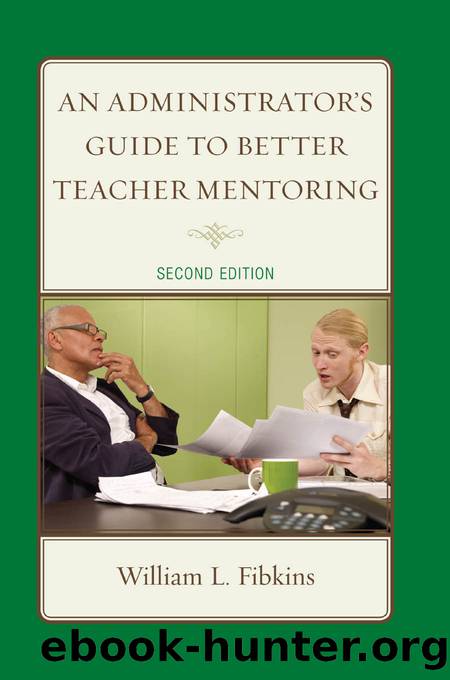An Administrator's Guide to Better Teacher Mentoring by Fibkins William L.;

Author:Fibkins, William L.;
Language: eng
Format: epub
Publisher: R&L Education
Published: 2011-08-15T00:00:00+00:00
THE ASSISTANT PRINCIPAL AS MENTOR
One of the major themes in this book is the acknowledgement that bad times, failure, and burnout can happen to every teacher, even the most successful ones. It may be more difficult for star teachers to be aware that they are losing positive contact with their students and colleagues. Itâs not supposed to happen to them. These are the teachers who have won the teacher of the year awards and held elected office in local, state, and national professional associations, such as the National Middle School Association, the Association for Supervision and Development, and Phi Delta Kappa.
These teachers regularly make keynote speeches at conferences, lead staff development workshops, and serve on select state and national government committees on issues such as education reform. They are known throughout their school, district, state, and even nation as prime examples of professionalism and creative teaching. They are always in demand from an education, parent, or citizen group, receiving a steady stream of phone calls asking them to be the keynote speaker at a conference. They are the go-to experts that the media zeroes in on when an issue arises, such as student violence at Columbine High School. They are interviewed by the press and on television and radio.
In a sense, these teachers create another âexpertâ persona in addition to their teaching persona. In a real sense they have created another role that may increasingly take them away from their primary role, that of classroom teacher. On the fast track to stardom, their primary focus moves from the classroom to the speaking circuit. In the process, their teaching world, and the teaching world of their students, begins to change. The boundaries get rearranged.
At first, this new star role is met with support and enthusiasm by district superintendents, principals, school board members, and community leaders. The newly acclaimed teacher begins to draw rave reviews. It helps put the district and school leaders on the map. They have to be doing something right if they are cultivating such fine teachers. It helps pass budgets, raise morale, and move the educational climate away from a focus on problems to one of success. Itâs a win-win situation, or so it seems, for everyone.
Things often change, however, as the star teacher begins to miss more and more class time. A vacuum sets in and a sense of loss develops. The boundaries are different for students, parents, and colleagues. Students, faced with a succession of subs, grow disgruntled. Kids develop a close relationship with an effective and caring teacher. When that is taken away from them, they notice. Like children in a family affected by divorce, they develop a sense of loss or even betrayal.
Parents, too, sense a loss and betrayal. Although initially proud of the star teacherâs success, they grow weary of the parade of subs and lack of continuity. They vow that next yearâs teacher will be classroom-based with a main focus on working with the class.
Fellow teachers also begin to react to a star teacher, as well.
Download
This site does not store any files on its server. We only index and link to content provided by other sites. Please contact the content providers to delete copyright contents if any and email us, we'll remove relevant links or contents immediately.
The Art of Coaching Workbook by Elena Aguilar(50430)
Trainspotting by Irvine Welsh(21224)
Twilight of the Idols With the Antichrist and Ecce Homo by Friedrich Nietzsche(18389)
Fangirl by Rainbow Rowell(8890)
Periodization Training for Sports by Tudor Bompa(8008)
Change Your Questions, Change Your Life by Marilee Adams(7482)
This Is How You Lose Her by Junot Diaz(6572)
Asking the Right Questions: A Guide to Critical Thinking by M. Neil Browne & Stuart M. Keeley(5489)
Grit by Angela Duckworth(5380)
Red Sparrow by Jason Matthews(5277)
Paper Towns by Green John(4911)
Room 212 by Kate Stewart(4855)
Ken Follett - World without end by Ken Follett(4522)
Housekeeping by Marilynne Robinson(4155)
The Sports Rules Book by Human Kinetics(4153)
Double Down (Diary of a Wimpy Kid Book 11) by Jeff Kinney(4046)
Papillon (English) by Henri Charrière(4021)
The Motorcycle Diaries by Ernesto Che Guevara(3863)
Exercise Technique Manual for Resistance Training by National Strength & Conditioning Association(3857)
